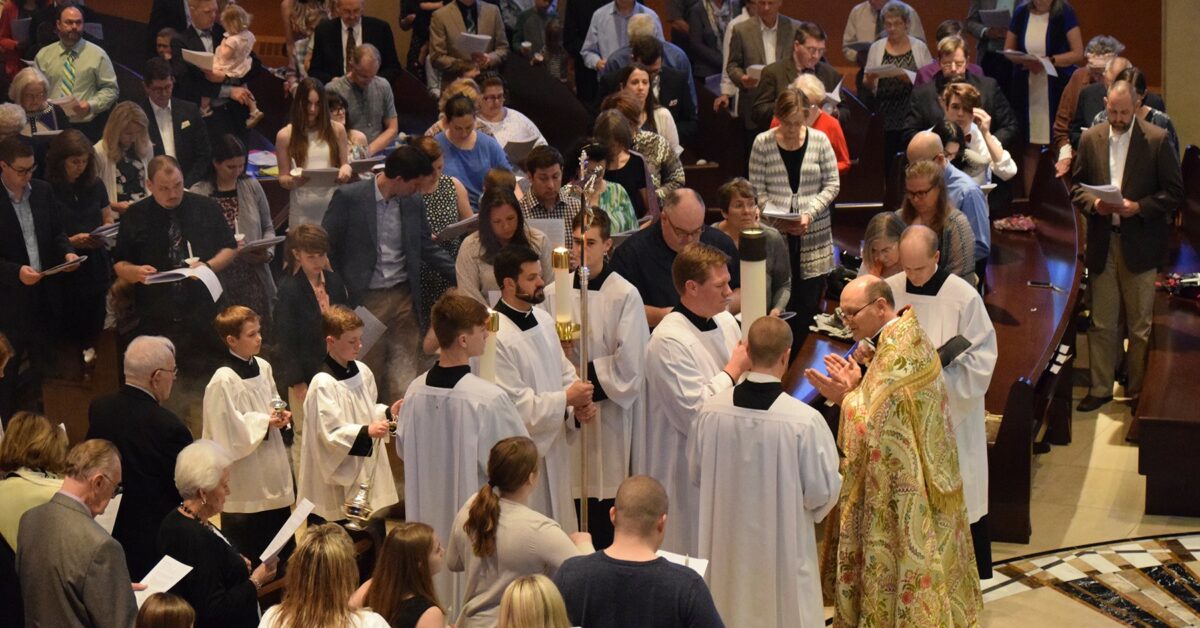A Ritual Journey: Rites of the Word
The Catechumenate stage in the RCIA is filled with a number of minor rites, minor in comparison to the major rites by which catechumens move from one stage to the next, such as the Rite of Election. These minor rites include: Celebrations of the Word of God; Minor Exorcisms; Blessings of the Catechumens; and Anointings of the Catechumens. All of these rites are means by which God is working on the catechumens through the Word. They all flow from and lead back to the service of the Word in the Sunday liturgy. In subsequent weeks we’ll take a look at the exorcisms, blessings, and anointing, but let’s focus on these rites of the Word.
The Celebrations of the Word of God are the most significant of these minor rites. The RCIA says of them, “During the period of the catechumenate there should be celebrations of the Word of God that accord with the liturgical season and the needs of the community” (RCIA 81). Essentially these celebrations of the Word are mini-services of the Word, although they might include all of the elements of the Sunday service of the Word— collects, readings, psalm, hymn, brief homily, and blessing. They may conclude with one of the other minor rites such as a rite of blessing or anointing. The RCIA describes the purpose of these celebrations in the following way
- To implant in their hearts the teaching they are receiving;
- To give them instruction and experience in the different aspects and ways of prayer;
- The explain to them the signs, celebrations, and seasons of the liturgy;
- To prepare them gradually to enter the worship assembly of the entire community (RCIA 82).
Celebrations of the Word focus on catechesis and formation, shaped by the story of God in Christ through the liturgical year. They unfold the mystery of Christ through the Word in the church year. They function as a regular hearing and catechesis in the Word of God. As such, it is appropriate to observe these brief services of the Word (around 20 minutes maximum) every time the catechumens gather, including their weekly or regular catechetical sessions. These celebrations of the Word allow the Word and prayer to permeate the journey of the catechumens, centering their lives in the Word, prayer, and the community’s liturgy. Through these celebrations the Word penetrates the daily life, decisions, and actions of the catechumens.
In addition, the Word fills the lives of the catechumens every Sunday. Here the story of God in Christ by the Spirit shapes faith and daily life. The catechumens feast on the Word every Sunday and then may be dismissed to discuss what they have heard and taken to heart. These dismissals prior to the service of the Lord’s Supper, while unfamiliar to Lutherans, allow the catechumens, under the guidance of trained lay catechists, to reflect on the import for their faith and life of the words they have heard. While it might be a foreign practice, the dismissal of the catechumens fits the fellowship doctrine of the LCMS and promotes a serious catechesis in the Word of God. Through that catechesis the Word is broken open to the catechumens and they learn what it means to be conformed to that Word.
While some might think that the dismissals are inhospitable, as Bill Corcoran says in Preparing the Rites of Initiation, “This sending forth is a form of hospitality because the catechumens can not yet join us at the Eucharistic table…Simply by leaving, they remind the whole assembly of the dignity of baptism and the importance of the eucharist….It invites them to experience Christ’s presence in the sharing of the Word” (23-24).
Through the dismissals to reflect on and be catechized in the Word and through the regular Celebrations of the Word of God, catechumens are fed a steady diet of the Word. And in so doing, they become what they eat.
